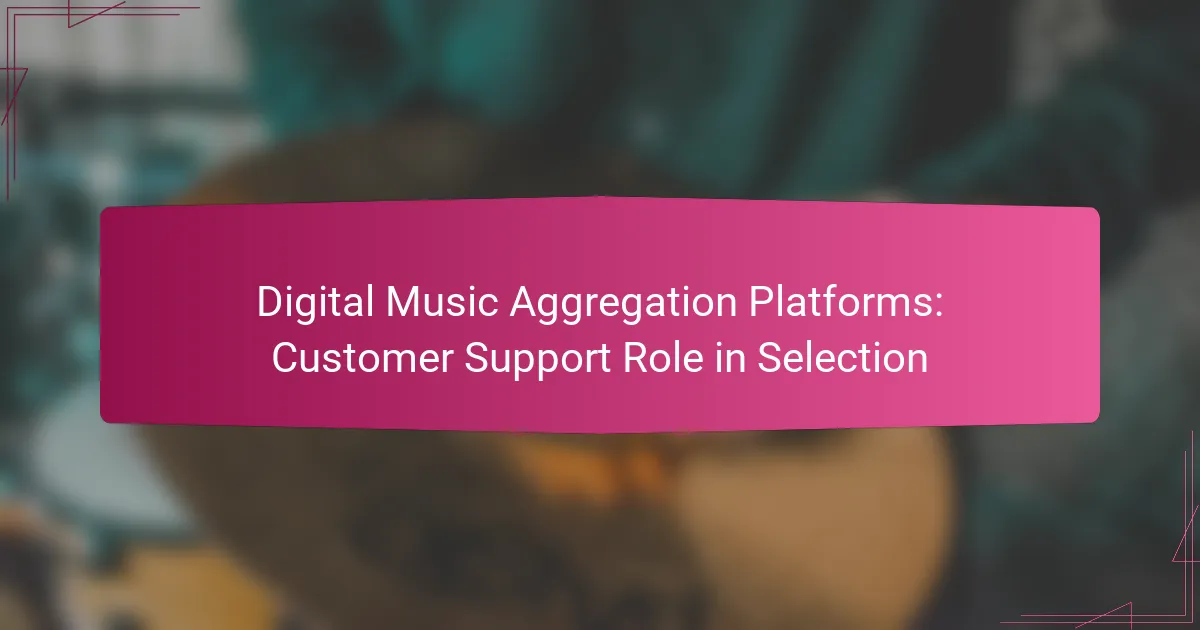When choosing a digital music aggregation platform, artists must consider not only the features and pricing but also the quality of customer support. A responsive and knowledgeable support team can greatly enhance the distribution experience, ensuring that artists can efficiently manage their accounts and resolve issues as they arise. Prioritizing customer support features, such as availability and communication methods, is essential for navigating the complexities of digital music distribution.
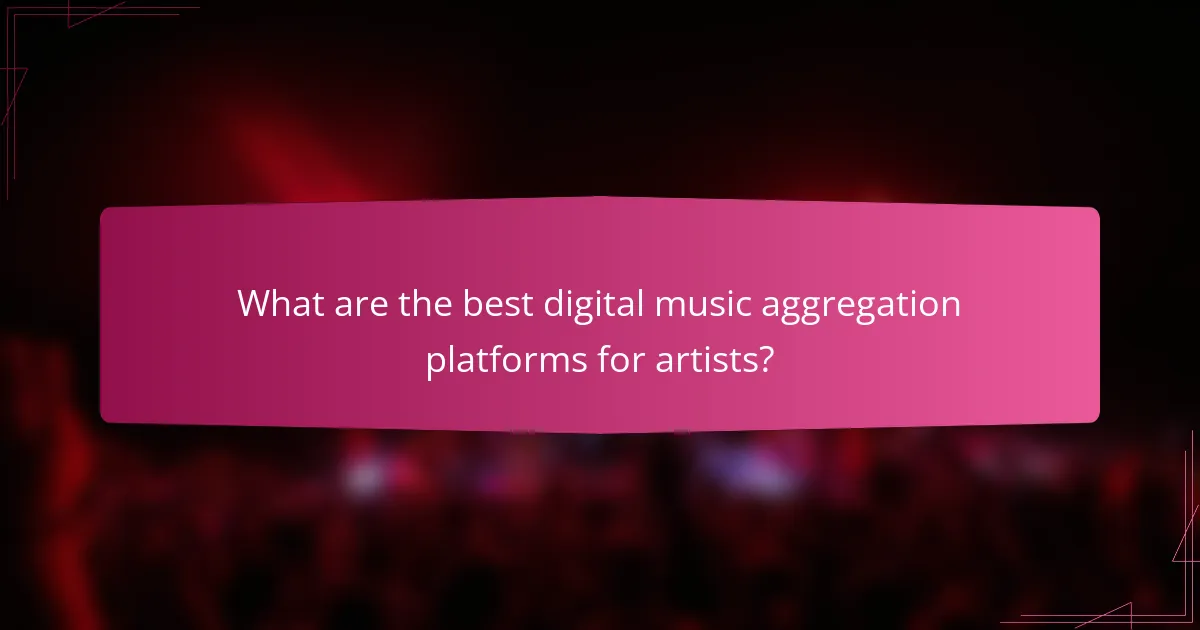
What are the best digital music aggregation platforms for artists?
The best digital music aggregation platforms for artists include DistroKid, CD Baby, TuneCore, AWAL, and Amuse. Each platform offers unique features, pricing structures, and support options that can significantly impact an artist’s distribution experience.
DistroKid
DistroKid is known for its user-friendly interface and unlimited distribution model. Artists can upload as many songs as they want for a flat annual fee, which makes it cost-effective for prolific musicians.
One key feature is its fast distribution, often taking just a few days to get music onto major streaming platforms. However, DistroKid does not offer physical distribution, so artists focusing on CDs or vinyl may need to consider other options.
CD Baby
CD Baby is a well-established platform that provides both digital and physical distribution. Artists pay a one-time fee per release, which can be beneficial for those who release music less frequently.
CD Baby also offers additional services like sync licensing and publishing administration, making it a good choice for artists looking to maximize their revenue streams. However, the upfront costs can add up, especially for multiple releases.
TuneCore
TuneCore operates on a pay-per-release model, charging artists annually for each album or single. This platform is ideal for artists who want to maintain control over their music rights while distributing to a wide range of platforms.
One advantage of TuneCore is its comprehensive reporting tools, which help artists track their earnings and performance. However, the cumulative costs can be higher than other platforms if releasing multiple projects each year.
AWAL
AWAL is a distribution service that focuses on independent artists and offers a unique revenue-sharing model. Artists can join AWAL by invitation, and there are no upfront fees, which can be appealing for emerging musicians.
AWAL provides personalized support and marketing tools, helping artists grow their audience. However, the exclusivity may limit access for some artists, and the platform may not be suitable for those seeking immediate distribution.
Amuse
Amuse is a free digital music distribution platform that allows artists to release music without any upfront costs. It offers a straightforward app for uploading tracks and managing releases, making it accessible for beginners.
While Amuse provides basic distribution services, artists can opt for a premium plan that includes additional features like faster release times and analytics. However, the free version may have limitations in terms of support and promotional tools.
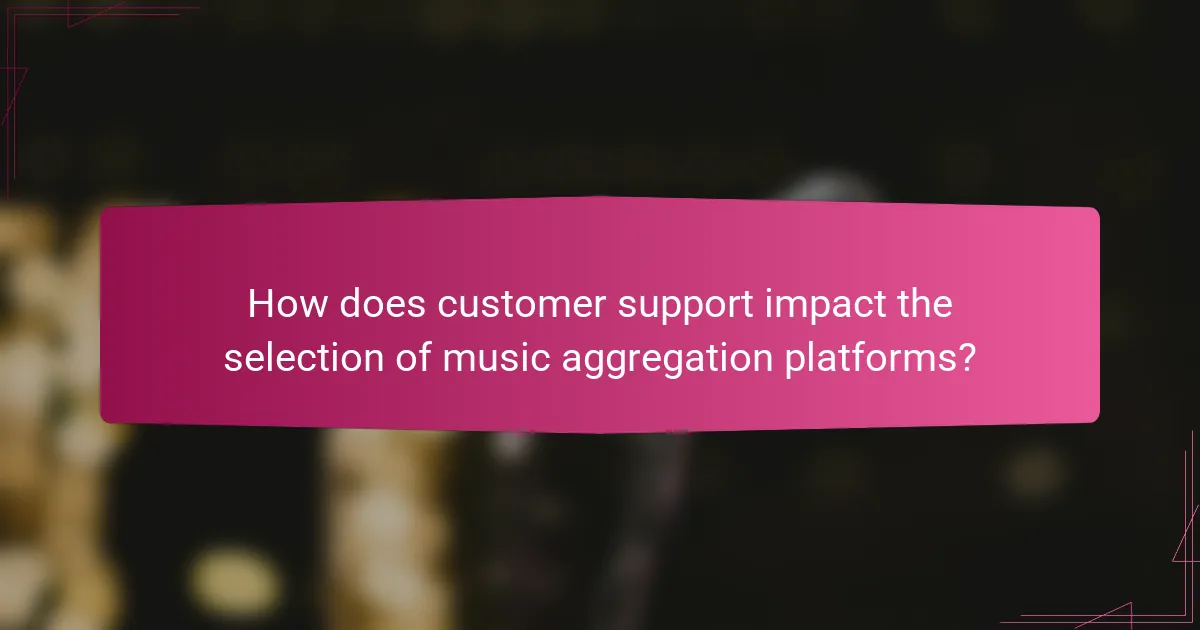
How does customer support impact the selection of music aggregation platforms?
Customer support plays a crucial role in selecting music aggregation platforms, as it directly affects user experience and problem resolution. A responsive and knowledgeable support team can significantly enhance the efficiency of distributing music and managing accounts.
Response time
Response time is a key factor in evaluating customer support for music aggregation platforms. Quick responses, ideally within a few hours, can prevent delays in music distribution and help artists address issues promptly. Look for platforms that guarantee response times or provide live chat options for immediate assistance.
Consider testing response times during the selection process by reaching out with questions. This can give you a practical sense of how quickly you can expect help when needed.
Availability of resources
The availability of resources such as FAQs, tutorials, and community forums can greatly enhance your experience with a music aggregation platform. Comprehensive resources allow users to troubleshoot common issues independently, saving time and reducing reliance on direct support. Platforms that offer extensive documentation and video guides are often more user-friendly.
Check if the platform provides a knowledge base or a dedicated support portal. This can be a valuable asset, especially for new users who may need guidance on various features.
Quality of assistance
The quality of assistance from customer support can vary widely among music aggregation platforms. Effective support should not only resolve issues but also offer insights and recommendations tailored to your needs. Look for platforms with positive reviews regarding their support staff’s expertise and helpfulness.
When evaluating quality, consider platforms that provide multiple channels of support, such as email, phone, and chat. This flexibility can enhance your overall experience and ensure that you receive the best possible assistance.
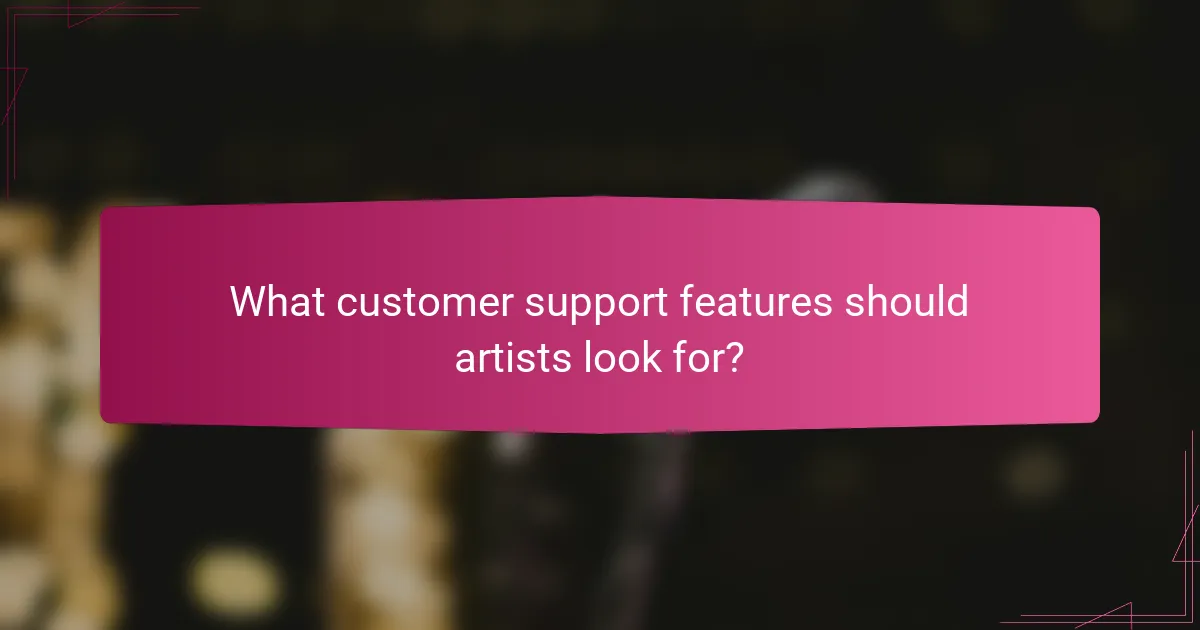
What customer support features should artists look for?
Artists should prioritize customer support features that ensure timely assistance and effective problem resolution. Key aspects include availability, communication methods, and access to information that can help artists navigate their digital music distribution needs.
24/7 availability
Having customer support available 24/7 is crucial for artists, especially those working across different time zones. This feature allows for immediate assistance whenever issues arise, whether it’s during a late-night release or an early morning inquiry.
When evaluating platforms, check if they offer round-the-clock support through various channels like phone, email, or chat. This ensures you won’t be left waiting for help when you need it most.
Live chat options
Live chat support can significantly enhance the customer experience by providing real-time assistance. This feature allows artists to receive quick answers to their questions without the delays often associated with email or phone support.
Look for platforms that integrate live chat directly on their website or app. This can streamline communication and help resolve issues in a matter of minutes, making it a valuable tool for busy artists.
Comprehensive FAQs
A well-structured FAQ section can save artists time by addressing common questions and concerns. It should cover a wide range of topics, from account setup to royalty payments, helping users find answers quickly without needing to contact support.
When assessing a platform, review their FAQ section for clarity and depth. A robust FAQ can empower artists to troubleshoot issues independently, which is especially useful during critical moments like a release or promotional campaign.
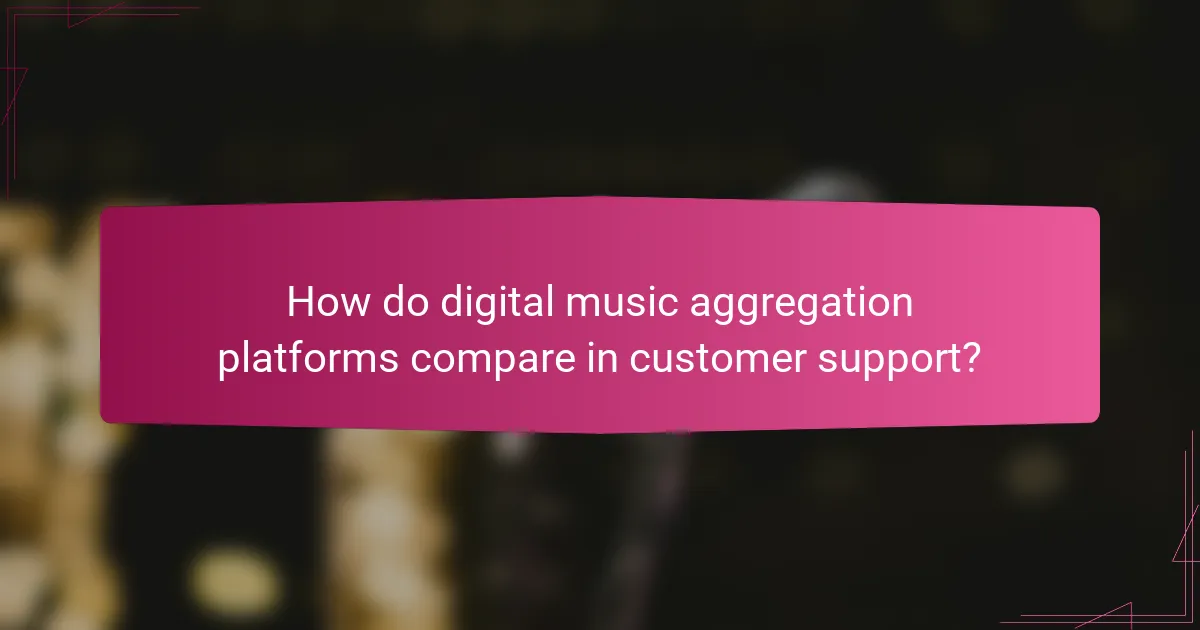
How do digital music aggregation platforms compare in customer support?
Customer support is a critical factor when choosing a digital music aggregation platform, as it can significantly impact an artist’s experience and success. Platforms vary in their support offerings, including response times, availability of resources, and the types of assistance provided.
DistroKid vs. CD Baby
DistroKid is known for its fast customer support, often providing responses within a few hours. They offer a simple online help center and email support, but lack phone support. In contrast, CD Baby provides more comprehensive support options, including phone assistance and a detailed knowledge base, making it easier for artists to find solutions to their issues.
When choosing between these two, consider your preference for response speed versus the availability of direct support. If you value quick email responses, DistroKid may suit you better, while those needing more personalized help might prefer CD Baby.
TuneCore vs. AWAL
TuneCore offers robust customer support through email and a help center, but users often report longer wait times compared to AWAL. AWAL, on the other hand, provides dedicated account managers for artists, ensuring personalized support and quicker resolution of issues. This can be particularly beneficial for emerging artists seeking tailored guidance.
Evaluate your needs: if you require immediate assistance, TuneCore might be less ideal. However, for artists looking for a more hands-on approach, AWAL’s dedicated support could be a significant advantage.
Amuse vs. other platforms
Amuse stands out for its unique approach to customer support by offering a free tier that includes basic assistance through email. However, the response times can be slower compared to paid services. In contrast, many other platforms, like CD Baby and TuneCore, provide more immediate support options, including phone assistance for paying customers.
When considering Amuse, weigh the benefits of free distribution against the potential delays in support. If you are an artist on a budget, Amuse may be appealing, but for those who prioritize prompt assistance, investing in a platform with better support may be worthwhile.
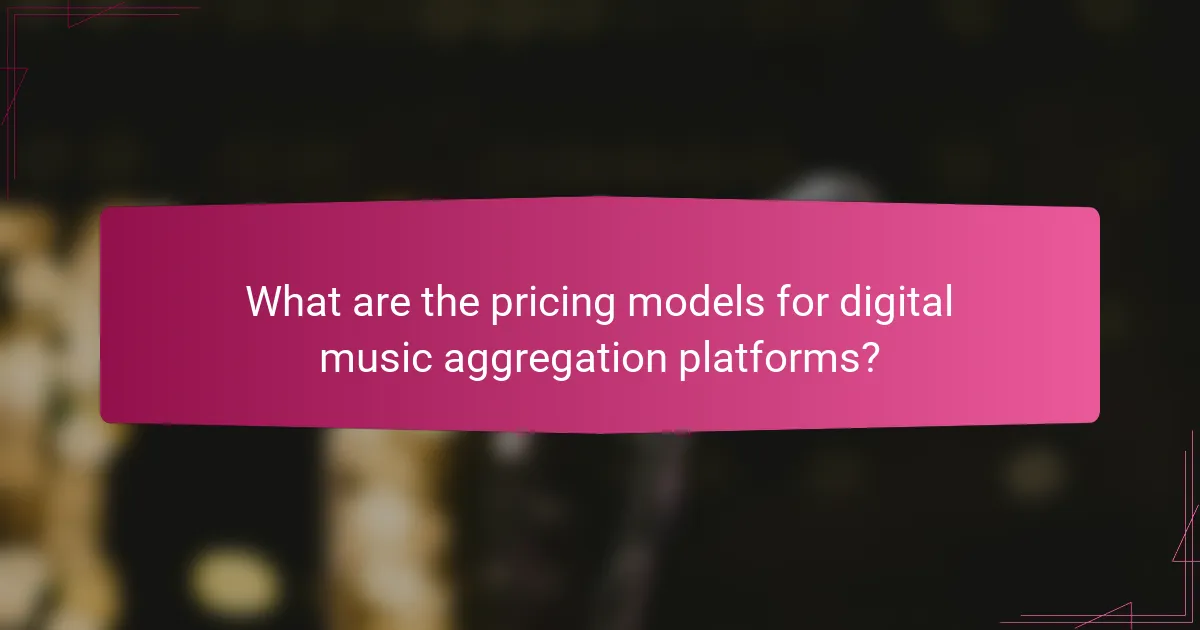
What are the pricing models for digital music aggregation platforms?
Digital music aggregation platforms typically operate under three main pricing models: subscription-based, one-time fee, and revenue share. Understanding these models helps artists and labels choose the right service based on their needs and financial strategies.
Subscription-based
Subscription-based models charge users a recurring fee, often monthly or annually, for access to the platform’s services. This model is popular among independent artists who release music regularly, as it provides continuous access to distribution and support.
Costs can vary widely, typically ranging from around $10 to $50 per month, depending on the features offered. Some platforms may offer tiered pricing, allowing users to select a plan that fits their budget and distribution needs.
One-time fee
The one-time fee model requires users to pay a single upfront cost for distribution of a specific release. This can be appealing for artists who prefer to avoid ongoing costs and want to budget for each release individually.
Prices for one-time fees generally range from $10 to $100 per release, depending on the platform’s reach and additional services included, such as promotional tools or analytics. It’s important to evaluate what is included in the fee to ensure it meets your distribution goals.
Revenue share
Revenue share models take a percentage of the earnings generated from music sales and streams. This model aligns the platform’s success with the artist’s success, as the platform earns more when the artist does.
Typically, revenue shares can range from 10% to 30% of the artist’s earnings, depending on the platform. Artists should carefully review the terms to understand how much they will retain from their sales and streams, and consider how this impacts their overall revenue strategy.
